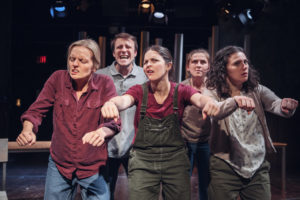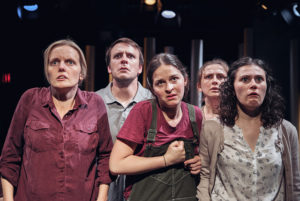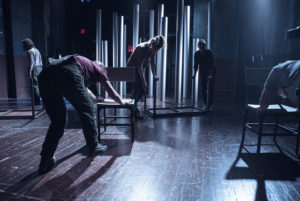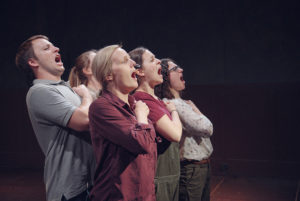This is a BSL review of The Good Earth by Motherlode Theatre Company performed at Chapter Arts Centre, Cardiff. A written transcription is available below the video.
It was interesting recently I saw a play named ‘The Good Earth’

An interpreter was provided called Julie Doyle. She was fantastic. The story was emotional. It was emotional though seeing change. Various people moving away. The spirit of the community was changing.
I became to understand Valleys and appreciate community. Change is not nice as when people do not people move away the spirit of the community changes
It was interesting to see the actors use chairs and tablets to show destruction

The Interpreter’s role did shift which is important to see and identify which character was talking.
At the end of the play I reflected it must be nice to live in a close knit community in the valley.
If you haven’t seen the play please do watch it.
Thank you
http://motherlodetheatre.com/thegoodearth/#thegoodearth/about
Tag Archives: the good earth
REVIEW: THE GOOD EARTH, CHAPTER ARTS CENTRE 20TH SEPTEMBER 2016
 (3 / 5)
(3 / 5)I am always slightly filled with dread and anxiety when I see any show which is based in the South Wales Valleys. Firstly there’s the debate about where the ‘valleys’ begins and where Cardiff ends. Cardiff dwellers seem to assume that ‘the valleys’ starts somewhere north of Llandaff, while also lumping in Bridgend and much of Swansea as well – well we all sound ‘Welshy’ don’t we?
My childhood friend is insistent to the point of violence that our home town (Tonyrefail, in case you’re interested) is categorically technically in ‘the valleys’ and absolutely and most definitely outside the perimeter of the ‘Rhondda’. This is important (ol’rite?!). What she has against the Rhondda I don’t know. You’d swear it had a negative reputation or something!
As you may have picked up I probably have a chip on my shoulder the size of a Christmas ham where all this is concerned. It’s often not comfortable viewing for me. And I’m going to be frank, I found the first 10 minutes of ‘The Good Earth’ a hard watch as I tuned in to the story…the accents, the blocking and the furniture scraping across the stage.
Musically, the cast gelled wonderfully and I adored the additions of the Welsh hymns and lullabies interspersed with the scenes. The song ‘Mae gen i dipyn o dy bach dwt’ (Translated as ‘Tidy little house’) was a perfect song for the backdrop of the play, which appears to be based on a real story. Villagers in a mountainside village are threatened with being moved from the community they love and have lived in for generations. We see a family and their extended friends and family battling the local authority (and each other) as they fight it out.
We’re introduced to all the people ‘all living in a big long street’ – all ‘Mr’ and ‘Mrs’…one by one. It all sounds very lovely and cosy. I cringe at the mention of seeing sheep from a window. (Really? Most kids don’t see a single bloody sheep til they visit Folly Farm when they’re 10!). But bit by bit, the innocence and sweetness of little Jackie (played by Gwenllian Higginson) wins me over and helps me lower my defenses.
There are some really crisp references and superb lines which echo and crystalise life growing up in the valleys (for me anyway). Ever been ‘bastard cold’ or ‘bastard tamping’? Mam Dina describes her situation as ‘Bastard hard’…and of course you always know Mam’s gonna blow when there is a ‘bastard’ before the next word! You will of course be familiar with vol-au-vonts, which has been standard fayre in the valleys since the seventies and remains so to this day. In fact people go to funerals mostly to eat vol-au-vonts at the wake. True story.
I adored the little scene where Dina puts on a spread and is cross-examining poor Gwen with her preparation technique. There’s an uncomfortable pause as Gwen described putting ‘a touch of black pepper’ on the vol-au-vont as a finish. ‘A bit much that is, Gwen’ came the response. I had the same type of experience when I tried to buy an Avocado in Porth a few months back – the cashier in Morrisons looked at me with pity and distrust as I described how I was going to make Guacamole with it.
This wasn’t the most uplifting of plays, but it throws up a million questions that will keep you pondering long after you’ve seen it – do our roots really matter, do they define who we are, is a house just a house…and do you like ‘fruit compost’ with your cheesecake? (Possibly one of the best lines of the night!).
Duration: approx 1hr 20min, no interval



